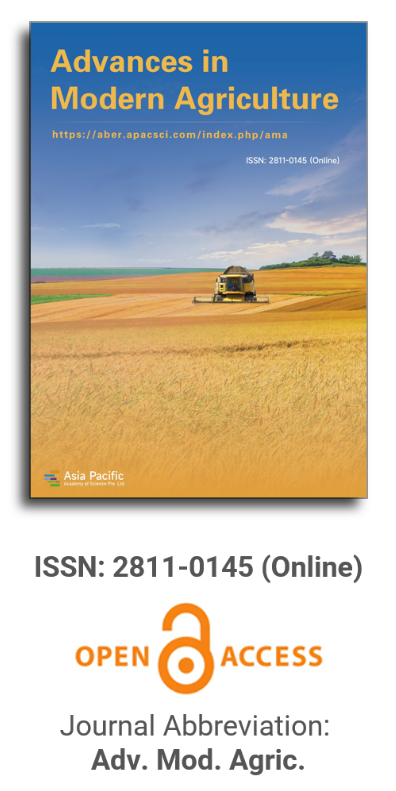


Comprehensive evaluation of modern agricultural development level in contiguous destitute area of Lvliang Mountain, Shanxi Province
Vol 1, Issue 1, 2020
VIEWS - 5276 (Abstract)
Download PDF
Abstract
An evaluation model was established using a combination of AHP and multi-objective linear weighted function methods to comprehensively evaluate the development level of modern agriculture in the contiguous poverty-stricken areas of Lvliang Mountain in Shanxi Province. The results show that: (1) As a whole, the contiguous poverty-stricken areas have a low degree of agricultural modernization and are in the initial stage of development. The degree of modernization of agricultural production conditions, agricultural production results, and farmers’ living standards is gradually decreasing; at the municipal level, the degree of agricultural modernization in the three cities is the same. Not high, the order is Xinzhou City > Linfen City > Lvliang City; at the county level, the degree of agricultural modernization varies greatly. The counties in Xinzhou City are in the high-level sub-stage of the initial stage, and the counties in Lvliang City are in the low-level sub-stage of the initial stage. The overall degree of agricultural modernization in counties shows a spatial pattern of low in the middle and high in the north and south; (2) The contributions of agricultural production conditions, production results and farmers’ living standards to modern agriculture are 16.4%, 29.7% and 53.9% respectively. The low level of agricultural electrification and mechanization and backward production conditions are bottlenecks in the development of modern agriculture. The backward agricultural production conditions lead to inefficient production results, low disposable income of farmers, and low living standards of farmers, which are the root causes of the slow development of modern agriculture in the region.
Keywords
References
- Lu L. Regional Economic Development and Modernization of Underdeveloped Regions (Chinese). Beijing: China Economic Press; 2002.
- Li W, Mi W. A review on regional functional regionalization (Chinese). Economic Geography 2008; 28(3): 357–361.
- Wu A, Li L, Yu J, et al. Study on evaluation index system of agricultural modernization in Shanghai (Chinese). Journal of Shanghai Agricultural Sciences 2015; 31(2): 1–7.
- Li J, Wang Y. Spatial coupling characteristics of eco-environmental quality and economic poverty in Lvliang area (Chinese). Chinese Journal of Applied Ecology 2014; 25(6): 1715–1724.
- Heady C. Natural resource sustainability and poverty reduction. Environment and Development Economics 2000; 5(3): 241–258. doi: 10.1017/S1355770X00000164
- Gao C, Qiu J, Yin C, et al. Evaluation and model selection of urban modern agriculture development level in Zhengzhou City (Chinese). Chinese Journal of Agricultural Resources and Regional Planning 2013; 31(4): 18–23.
- Zhao H, Zhang W, Ma Y, et al. Construction and practice of modern agricultural evaluation system in three counties and one city of Shenyang (Chinese). Jiangsu Agricultural Sciences 2012; 40(2): 349–352.
- Huang Y, Shi Y. Construction and case study of urban modern agriculture evaluation index system in Beijing (Chinese). Journal of Beijing Agricultural University 2007; 22(3): 61–65.
- Ma G, Li L, Xuan X, et al. SWOT analysis of urban modern agriculture development in Suzhou during the 13th Five-Year Plan (Chinese). Jiangsu Agricultural Sciences 2017; 45(4): 307–310.
- Wang Q, Bao X. Construction and evaluation of Ningxia modern agriculture evaluation index system (Chinese). Ningxia Agriculture and Forestry Science and Technology 2011; 52(5): 77–79.
- Stoorvogel JJ, Antle JM, Crissman CC, Bowen W. The trade off analysis model: Integrated bio-physical and economic modeling of agricultural production system. Agricultural Systems 2004; 80(1): 43–66. doi: 10.1016/j.agsy.2003.06.002
- Bellows B. Sanrcm Research Report No. 1–95, Proceedings of the Indicators of Sustainability Conference and Workshop. Washington State University; 1994.
- Ma S, Bai C, Wang R, et al. Study on development planning of modern agriculture in Yuanping City (Chinese). Chinese Agricultural Science Bulletin 2013; 29(32): 164–170.
- Tang X, Zhang Z, An Y. Landscape resource evaluation of traditional villages in The West Mountain of Taihu Lake based on GIS-AHP analysis (Chinese). Journal of Gansu Agricultural University 2014; 52(4): 124–132.
Supporting Agencies
Copyright (c) 2020 Qin Ji, Jianping Yang, Manhou Xu

This work is licensed under a Creative Commons Attribution 4.0 International License.

This site is licensed under a Creative Commons Attribution 4.0 International License (CC BY 4.0).

Prof. Zhengjun Qiu
Zhejiang University, China

Cheng Sun
Academician of World Academy of Productivity Science; Executive Chairman, World Confederation of Productivity Science China Chapter, China
Indexing & Archiving
In the realm of modern agriculture, the integration of cutting-edge technologies is revolutionizing the way we approach sustainable farming practices. A recent study published in Advances in Modern Agriculture titled "Classification of cotton water stress using convolutional neural networks and UAV-based RGB imagery" has garnered significant attention for its innovative approach to precision irrigation management. Conducted by researchers from Institute of Data Science and the AgriLife Research and Extension Center of Texas A&M University (authors's information is below). This study introduces a novel method for classifying cotton water stress using unmanned aerial vehicles (UAVs) and convolutional neural networks (CNNs), offering a powerful solution for optimizing water use in agriculture.
Modern agricultural technology is evolving rapidly, with scientists collaborating with leading agricultural enterprises to develop intelligent management practices. These practices utilize advanced systems that provide tailored fertilization and treatment options for large-scale land management.
This journal values human initiative and intelligence, and the employment of AI technologies to write papers that replace the human mind is expressly prohibited. When there is a suspicious submission that uses AI tools to quickly piece together and generate research results, the editorial board of the journal will reject the article, and all journals under the publisher's umbrella will prohibit all authors from submitting their articles.
Readers and authors are asked to exercise caution and strictly adhere to the journal's policy regarding the usage of Artificial Intelligence Generated Content (AIGC) tools.
Asia Pacific Academy of Science Pte. Ltd. (APACSCI) specializes in international journal publishing. APACSCI adopts the open access publishing model and provides an important communication bridge for academic groups whose interest fields include engineering, technology, medicine, computer, mathematics, agriculture and forestry, and environment.



.jpg)
.jpg)

.jpg)
